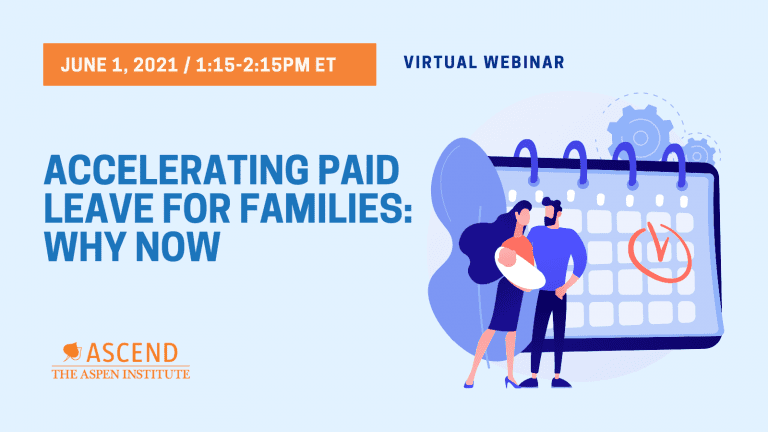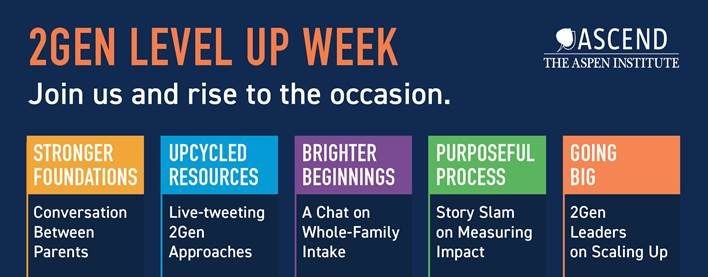WEBINAR: Building a Thriving Tennessee: A 2Gen Approach
May 7, 2018 | Webinars
On Tuesday, April 10, Ascend hosted a webinar on an upcoming case study release: Building a Thriving Tennessee: A 2Gen Approach. We’re happy to share the presentation slides and a recording of the webinar with you, as well as responses to your questions from our panelists, Commissioner Danielle Barnes and Tiffany Day, Executive Advisor and 2Gen Consultant, from the Tennessee Department of Human Services. We express our heartfelt gratitude to them both for their presentation. We look forward to the formal release of the case study in Nashville, TN, on June 1 – stay tuned for live stream information.
Questions from the webinar:
- How many job creation staff do you have? DHS has 1 Employment and Education Coordinator, who is housed in central office. Her role is to coordinate statewide workforce development, employment, and education opportunities with state, local, public and private agencies. She works with nearly 100 DHS staff located across the state who, as a part of their larger role, conduct research on area job opportunities and post them to county office job boards. She also manages the DHS Workforce Council, whose charge is to establish a consistent and comprehensive roadmap to help guide customers to education and employment opportunities. DHS’ Division of Rehabilitation Services (RS) also participates in the ECD Apprenticeship Program- a function of the TN Department of Economic and Community Development (ECD). A total of 7 Business Employment Consultants (BECs) collaborate with partnering businesses to provide area employment opportunities for customers receiving rehab services.
- Has TDHS partnered with any city governments to bring the 2Gen programs to urban residents? Though we have engaged Mayors and local government in conversations around 2Gen programs, our primary strategy has been establishing community based partnerships to impact communities (i.e. Agape in Memphis and United Way of Metro Nashville in Nashville). The Department also partners with nearly 30 Human Resource Agencies and Community Action Agencies through our Community Services Block Grant (CSBG) and Social Services Block Grant (SSBG) programs. Our CSBG and SSBG partners provide direct services to customers across the state, oftentimes providing supplemental assistance for families requiring immediate support.
- Can you talk a little about how you got your legislature on board with the increase in TANF benefits? The Department wrote a well-rounded bill and started our communication early. The first step of the process for buy in started with writing a bill that would be amenable to both sides of the aisle. That meant strengthening our laws around fighting fraud, waste and abuse while also promoting self-sufficiency through the transitional benefits and raising the TANF allotment. Governor Haslam’s support was a major component of getting support for this legislation. TDHS also made it a point to talk to legislative leadership in both the House and the Senate before the bill was introduced. Once we had support from legislative leadership, the Department remained open and honest with all legislators so that everyone felt comfortable with the bill and remained receptive to certain amendments. The bill also went through 2 committees in the Senate and 6 in House so there was plenty of time for public forum questions. Ultimately the Department’s legislation passed 31-1 in the Senate and 88-7 in the House with overwhelming bi-partisan support.
- How do multigenerational families (i.e. grandparents raising grandkids) fit within these approaches? Our approach remains the same. The Department strives to provide wraparound support for the entire family. A major component for us in the multigenerational journey is ensuring that families have community support.
- Are these programs offered in both rural and urban areas? What is the success rate in rural areas? These programs are offered across the state in both rural and urban areas. For instance, in rural East Tennessee, we are partnering with East TN State University and the Nurse Family Partnership (NFP) to improve child and parent outcomes through home visiting. This 3 year pilot prevention program offers supports, resources, and in-home services to first-time expectant mothers who are no more than twenty-eight (28) weeks pregnant and reside in one of the Northeastern Tennessee Counties (i.e. Carter, Greene, Hancock, Hawkins, Johnson, Sullivan, Unicoi, and Washington). By targeting rural counties in this way, we are able to reduce common barriers to accessing services/resources (i.e. transportation).
- When will the increase allotment take place and the amount? (assume this is referring to TANF) Tennessee’s current TANF allotment is 20% of the 1996 standard of need and has not been revisited since 1996. Through legislation, DHS is increasing the 20% baseline of the current standard of need by 2% for each person in household (i.e. 22% for one, 24% for two, 26% for three, etc.). With this change, a family of three’s maximum grant will increase from $185 to a maximum of $277. This change improves TN’s ranking relative to TANF grant amounts- moving from the 2nd lowest in the nation to “tied” for 6th lowest in the nation.
Related Posts

When funding becomes scarce and politics impact programs, how can government leaders stay true to the families they serve? In short, by putting ...

On Tuesday, June 1st, 2021, Ascend at the Aspen Institute’s Family Prosperity Innovation Community hosted a panel discussion about the recently prop...

While the COVID-19 pandemic may restrict us from convening together in person, that shouldn’t stop us from holding powerful conversations about the ...












